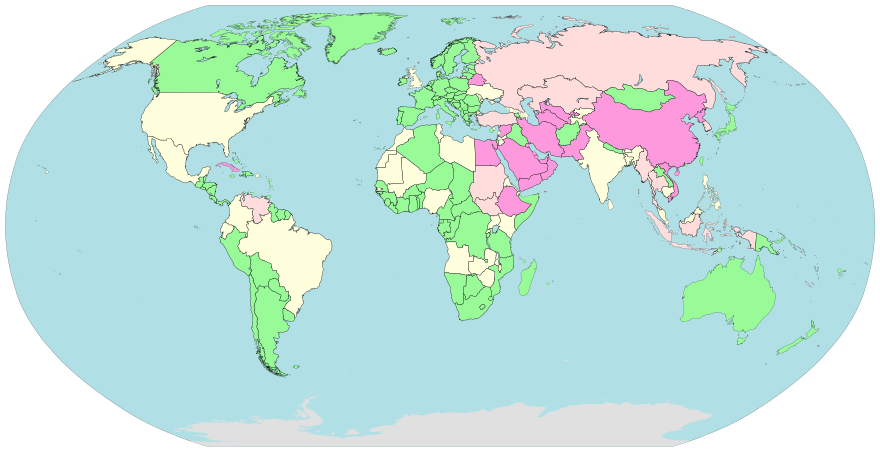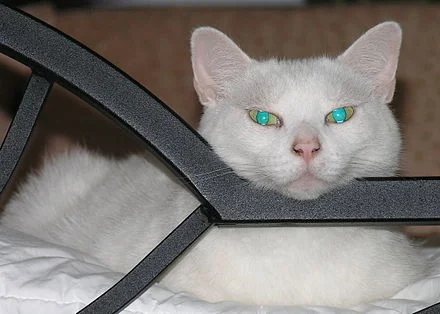
Chris Powell: Fight bulimia with censorship?
Internet censorship by country: Dark pink has pervasive censorship; light pink substantial; yellow selective, and green little or none.
The plaster cast of Michelangelo’s ‘‘David ‘‘ at the Victoria and Albert Museum, in London, has a detachable plaster fig leaf displayed nearby. Legend claims that the fig leaf was created in response to Queen Victoria's shock upon first viewing the statue's nudity, and was hung on the figure before royal visits, using two strategically placed hooks.
MANCHESTER, Conn.
Nearly everyone on Planet Earth with Internet access seems to use the social-media platform Facebook and its subsidiary Instagram even as last week's U.S. Senate subcommittee hearing over which Connecticut's Richard Blumenthal presided suggested that Facebook is an evil scheme to push young teenage girls into bulimia and other psychological disorders.
Facebook and Instagram certainly have brought out the latent narcissism of hundreds of millions of people, allowing them to spend half their day inflicting on others every trivial detail of their lives. But of course no one is compelled to participate in social media, and young teenage girls can participate only if their parents provide them with cell phones, computers and Internet access and pay little attention to what the kids do with those things.
This seemed lost on last week's hearing, as Senator Blumenthal read aloud a text message he said he had received from an unidentified father:
“My 15-year-old daughter loved her body at 14, was on Instagram constantly and maybe posting too much. Suddenly she started hating her body -- her body dysmorphia, now anorexia -- and was in deep, deep trouble before we found treatment. I fear she will never be the same.”
So who is responsible? The hearing accused Facebook co-founder and CEO Mark Zuckerberg.
And what is the remedy? The hearing seemed to be demanding censorship by the government.
"Facebook and Big Tech are facing a ‘Big Tobacco' moment," Blumenthal said, referring to the tobacco industry's long struggle against regulation of its product and its concealment of research showing that -- as everyone with half a brain had known for hundreds of years -- using tobacco is unhealthy.
Former Facebook employee Frances Haugen testified that the company knows that teenage girls are especially vulnerable to what may be said about them on social media -- as if anyone needed confidential company documents to confirm the neurotic tendencies of teenage girls.
But Facebook's product and the major product of technology companies is not tobacco. It is speech and self-expression, freedom of which is constitutionally guaranteed even when it is narcissistic, stupid, mistaken and capable of being construed destructively. All other vehicles for conveying expression and information are just as capable of facilitating the harm being attributed to Facebook and Instagram.
Haugen suggested that Congress repeal the law exempting Internet companies from being sued for content posted by their users. That well might be the end of social media, since there is no way to police large volumes of social-media postings except by using computer programs to target keywords, a mechanism that censors the innocent and the guilty alike.
And what about the individual privacy of communicating by Internet? Should the government be empowered to compel Facebook and other social-media companies to become general censors? If government can do that to social-media companies, it can do that to newspapers, magazines, broadcasters, e-mail service providers and even telephone companies.
While the teen years always will be full of psychological stress, most young people in the land of the free have recovered more or less and grown up to be glad of their freedom.
Yet last month the FBI reported a 30 percent annual increase in murders in this country, from which no one will be recovering. The country is coming apart, and it's not because of Facebook and bulimia.
xxx
Farmington's police union president, Sgt. Steve Egan, blames Connecticut's new police accountability law for the severe injury inflicted on Officer James O'Donnell last month when a man driving a stolen car sped off, crushing the officer against his cruiser.
No evidence has been provided for the union president's claim. But a failure of law can be seen here. For the man charged in the incident is reported to have a long criminal record. That is, a state with an incorrigibility law already might have put him away for life, or at least for enough years to eliminate his capacity for crime.
Connecticut is not such a state. Instead of enacting an incorrigibility law the state keeps closing prisons and letting incorrigibles hurt people.
Chris Powell is a columnist for the Journal Inquirer, in Manchester.
Chris Powell: So what if they have contempt for Trump; licensing cats in Conn.
Do journalists need protection from President Trump and his supporters? Connecticut U.S. Sen. Richard Blumenthal professes to think so.
With two other Democratic members of Congress. New Jersey Sen. Bob Menendez and California Rep. Eric Swalwell, Blumenthal has introduced what they call the Journalist Protection Act, which would make it a federal crime for "to intentionally cause bodily injury to a journalist affecting interstate or foreign commerce in the course of reporting or in a manner designed to intimidate him or her from newsgathering for a media organization."
Trump certainly is heaping contempt on news organizations, if no more than many news organizations are heaping contempt on him. For purposes of the law it hardly matters who is right, for each side is free to express contempt and even lie about the other short of the very limited actionable forms of libel. While this worsens political polarization and may help people rationalize political violence, there is no need for the Journalist Protection Act. The proposal is just another dreary episode of the political posturing that turns government into a big charade.
Journalists reporting sensitive matters have always been vulnerable to retaliation, but there is no epidemic of assaults on journalists in the United States.
Enacting federal law to criminalize what is already against state law everywhere, as ordinary assault is, would be needed only if a state was refusing to provide equal protection of the law, as segregationist states long failed to protect black people, condoning beatings and lynchings. But there is no evidence that the basic criminal law in any state has been so corrupted by the country's bitter politics that equal protection is in danger.
Besides, constitutional guarantees of free speech and press do not belong exclusively to people making a living from journalism. To the contrary, the right of free expression belongs to [ITALICS] everyone, [END ITALICS] so journalism is not a profession but everyone's [ITALICS] right. [END ITALICS] Journalists neither need nor deserve special protection because [ITALICS] anyone [END ITALICS] can be a journalist at any time. Since the invention of paper and then movable type, journalism always has been relatively easy to attempt, and now, thanks to the internet, everyone can instantly become a journalist with a potentially worldwide audience.
If enacted the Journalist Protection Act will provide no real protection to anyone, but then it's not meant to. It's meant only to remind the Trump haters in Trump-hating states that the bill's sponsors still hate Trump too. They could have said as much in a press release and avoided the expense of drafting legislation.
xxx
PREYING ON PETS: As if it's not enough to impose tolls on Connecticut's highways and eliminate a score of sales tax exemptions, legislation has been introduced in the General Assembly to license cats and charge $15 to anyone who adopts a cat or dog from a municipal shelter.
Yes, municipal shelters cost a little money but people who adopt the orphaned creatures save municipal government the expense of caring for them or euthanizing them. The cats-and-dogs bill should be tabled at least until, say, the salary of the president of the University of Connecticut is capped at the salary of the president of the United States, $400,000 a year, and state and municipal employees are no longer paid to stay home on Columbus Day while taxpayers drag themselves to work.
Chris Powell is a columnist for the Journal Inquirer, in Manchester, Connecticut.





